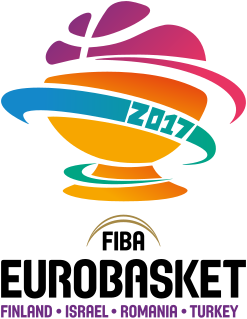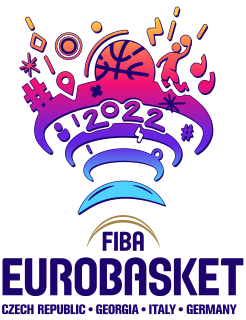
The Great Britain men's national basketball team represents Great Britain in international basketball competitions. The national team is administered by British Basketball.

The 2015 European Women Basketball Championship, commonly called EuroBasket Women 2015, was the 35th edition of the continental tournament in women's basketball, sanctioned by the FIBA Europe. The tournament was co-held in Hungary, which hosted the championship for the fifth time after 1950, 1964, 1983 and 1997, and Romania which hosted it for the second time after 1966, on 11–28 June 2015. The event was hosted by more than one country for the first time.

EuroBasket 2017 was the 40th edition of the EuroBasket championship that was organized by FIBA Europe and held between 31 August and 17 September 2017. Beginning from 2017, the continental championships take place every four years with a similar system of qualification as for the FIBA Basketball World Cup.

The 2017 European Women Basketball Championship, commonly called EuroBasket Women 2017, was the 36th edition of the continental tournament in women's basketball, sanctioned by the FIBA Europe. The tournament was awarded to Czech Republic after winning the bid to Serbia. The tournament also serves as a qualification for the 2018 FIBA Women's Basketball World Cup in Spain, with the top five nations qualifying. As hosts Spain finished in the top five, the sixth placed team also qualified.
The 2019 FIBA Basketball World Cup qualification was the first World Cup for which teams had to qualify for under the new qualification system. The process determined 31 out of the 32 teams that participated at the 2019 FIBA Basketball World Cup.

The EuroBasket 2022 was the 41st edition of the EuroBasket championship organized by FIBA Europe. It was the first since it was agreed it would take place every four years, with a similar system of qualification as for the FIBA Basketball World Cup. It was originally scheduled to take place between 2 and 19 September 2021, but due to the COVID-19 pandemic and the subsequent postponement of the 2020 Summer Olympics to 2021, it was postponed to September 2022.
The 2019 FIBA Basketball World Cupqualification for the FIBA Europe region, began in August 2017 and concluded in February 2019. Contrary to previous years, no teams were automatically placed into the World Cup, so all FIBA Europe nations had to participate in qualification.

Group D of EuroBasket 2017 consisted of Belgium, Great Britain, Latvia, Russia, Serbia and Turkey. The games were played between 1 and 7 September 2017. All games were played at the Ülker Sports Arena in Istanbul, Turkey.
Group C of the EuroBasket Women 2017 took place between 16 and 19 June 2017. The group played all of its games at Prague, Czech Republic.
The 2017 Serbia EuroBasket team represented Serbia and won the silver medal at the EuroBasket 2017 in Helsinki (Finland), Tel Aviv (Israel), Cluj-Napoca (Romania) and Istanbul (Turkey). They were automatically qualified for the EuroBasket by taking the 4th place in EuroBasket 2015. The team was coached by Aleksandar Đorđević, with assistant coaches Miroslav Nikolić, Milan Minić and Jovica Antonić.

The 2019 European Women Basketball Championship, commonly called EuroBasket Women 2019, was the 37th edition of the continental tournament in women's basketball, sanctioned by the FIBA Europe. The tournament was co-held in Latvia and Serbia from 27 June to 7 July 2019.
This page describes the qualification procedure for EuroBasket Women 2019.

The EuroBasket 2022 qualification was a basketball competition that was played from November 2017 to February 2021, to determine the 20 FIBA Europe nations who would join the automatically qualified co-hosts Czech Republic, Georgia, Italy, and Germany at the EuroBasket 2022 finals tournament.
The 2018–19 EuroLeague Women was the 61st edition of the European women's club basketball championship organized by FIBA, and the 23rd edition since being rebranded as the EuroLeague Women.
Twelve teams qualified for the women's basketball at the 2020 Summer Olympics tournament. The host nation and the 2018 World Cup winner qualified. Those two teams, however, had to play in the pre-qualifying and qualifying tournaments and took one of the qualifying spots from those tournaments. Thus, while two of the World Qualifying Tournaments provided quota spots to their three top teams, the other two tournaments provided quota spots only to the top two teams plus either the host nation or the World Cup winner.
Group A of the EuroBasket Women 2019 took place between 27 and 30 June 2019. The group consisted of Czech Republic, France, Montenegro and Sweden and played all games at Riga, Latvia.

The 2021 European Women Basketball Championship, commonly called EuroBasket Women 2021, was the 38th edition of the continental tournament in women's basketball, sanctioned by the FIBA Europe. It was co-hosted by France and Spain between 17 and 27 June 2021. It was the third time to be hosted by multiple countries. The tournament also served as part of European qualification for the 2022 FIBA Women's Basketball World Cup, with the top six nations advancing to the qualifying tournaments. The final were planned to be held at the AccorHotels Arena in Paris but moved to the Pavelló Municipal Font de San Lluís, in Valencia.
This page describes the qualification procedure for FIBA Women's EuroBasket 2021. 14 teams joined the co-hosts France and Spain.
Group A of EuroBasket 2022 consisted of Belgium, Bulgaria, Georgia, Montenegro, Spain, and Turkey. The games were played from 1 to 7 September 2022 at the newly built Tbilisi Arena in Tbilisi, Georgia. The top four teams advanced to the knockout stage.
This page describes the qualification procedure for EuroBasket Women 2023. 14 teams will join the co-host Israel and Slovenia.








